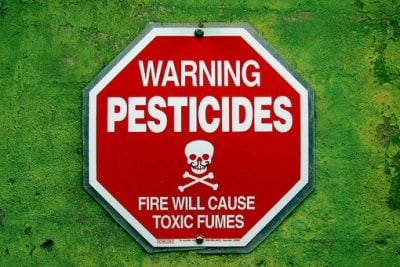Pesticides’ Devastating Impacts on Endangered Species
Lawsuit Launched Challenging EPA Decision

The Center for Biological Diversity filed a formal notice of intent to sue today over the Environmental Protection Agency’s “Revised Methods” for assessing pesticide risks to endangered species.
At the request of the pesticide industry, the EPA made extensive changes to the process set forth by the Obama administration — all of which would allow the agency to dismiss real-world impacts from pesticides. The new methods are designed to allow the EPA to ignore widespread harm from pesticides to most of the nation’s most endangered plants and animals, including American burying beetles, Rio Grande silvery minnows and Hawaiian hoary bats.
“The science is clear: Pesticides cause devastating harm to many of our most vulnerable plants and animals, and yet the EPA’s response is to issue new methods so it can cover its eyes and pretend everything’s fine,” said Lori Ann Burd, environmental health director at the Center. “The EPA’s refusal to protect endangered species from pesticides and continued bowing to the pesticide industry is nothing less than a national disgrace.”
The Revised Methods purposefully ignore many common ways imperiled plants and animals are harmed and killed by pesticides. For example, under the Revised Methods, the EPA will not consider downstream runoff of pesticides into water bodies where endangered aquatic species, like fish and snails, live. The new rules also allow the EPA to deliberately ignore the impacts of pesticides on endangered plants that depend on insect pollination, but whose pollinators are imperiled by pesticides.
The EPA’s final Revised Methods are only slightly less harmful than its draft version, which was described by the attorneys general of 10 states and the District of Columbia as “antithetical to the plain language and purpose of the ESA.”
Despite heavy criticism, the agency finalized many of the key provisions it designed to reduce protections for endangered species, including limiting protection to species whose range overlaps less than 1% with a pesticide-treated area, even if that 1% is the species’ most essential habitat, such as spawning habitat for salmon.
To date the EPA has never completed a nationwide Endangered Species Act consultation on pesticides or implemented a single conservation measure for any endangered species developed through such consultations.
Instead the agency has disregarded the expert recommendations of the National Academy of Sciences and undermined years of work by career scientists in order to prevent the implementation of common-sense restrictions on harmful pesticides.
“The EPA has fully embraced the worst tactics of the tobacco industry and climate-deniers, all so it can continue to ignore the serious harms it allows to be inflicted on endangered plants and animals,” said Burd. “We will not let the EPA get away with this.”
Records obtained through the Freedom of Information Act show that the new assessment methods were driven by political-level appointees at the EPA, Department of the Interior, Department of Commerce and the White House.
From 2013 to 2017, career scientists at the EPA and federal wildlife agencies worked to implement the recommendations of the National Academy of Science assessing the impacts of pesticides. This collaborative and transparent process was developed with hundreds of hours of stakeholder input but was halted when then acting Interior Secretary David Bernhardt was briefed on the results of the initial assessments in October 2017.
This unprecedented effort to scuttle endangered species consultations spurred the EPA and wildlife agencies to attempt to justify their failure to release the analysis and to demonstrate they are taking action to save endangered animals on the brink of extinction.
*
Note to readers: please click the share buttons above or below. Forward this article to your email lists. Crosspost on your blog site, internet forums. etc.
Featured image is from CounterPunch

